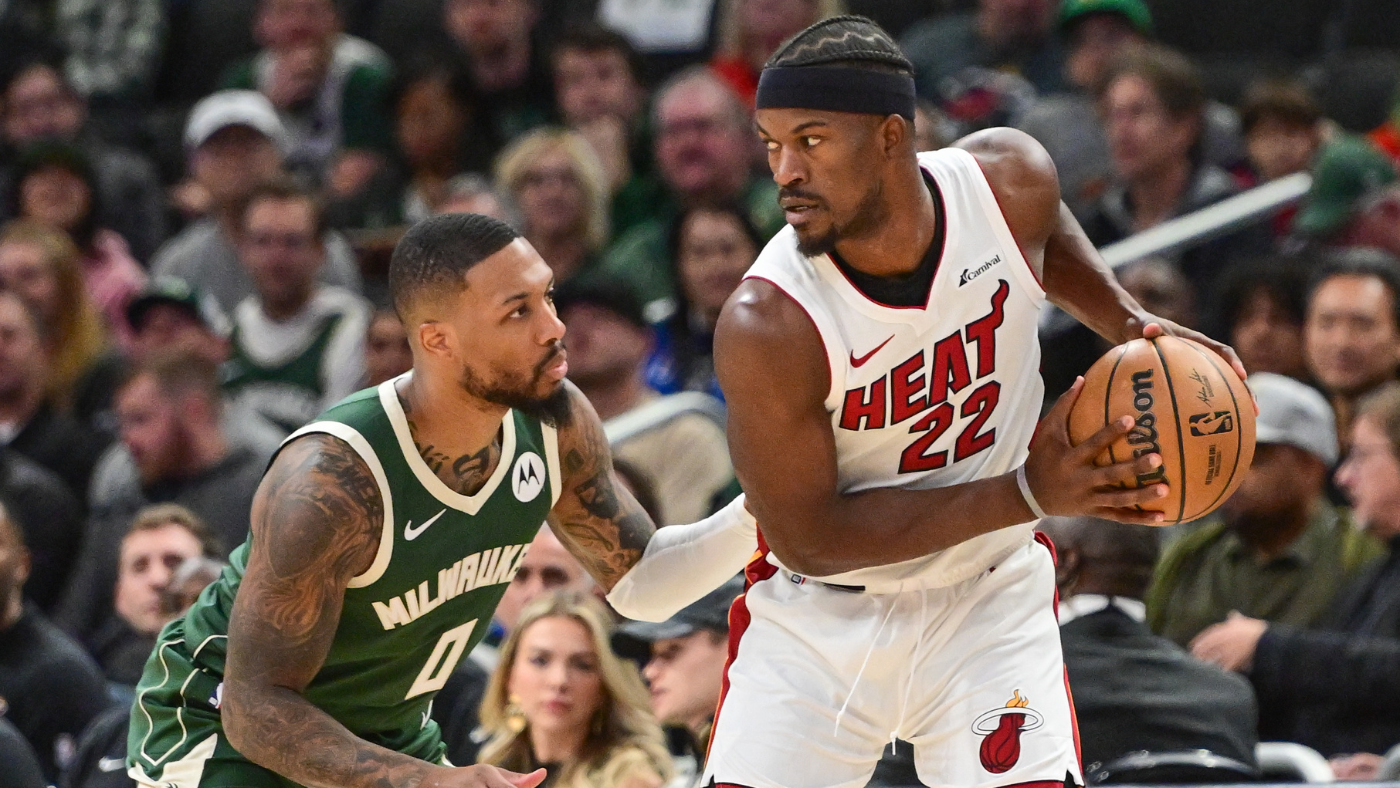With Heat ousted from playoffs, it’s hard not to wonder how Damian Lillard trade would’ve changed their season
Written by CBS SPORTS ALL RIGHTS RESERVED on May 2, 2024


Chris Bosh’s injury in Game 1 of the 2012 Eastern Conference semifinals turned out to be a somewhat seminal moment in the history of modern NBA team-building. It was arguably the strongest argument we’ve seen for a three-star roster build. The Miami Heat lost their next two games, but LeBron James and Dwyane Wade rallied to win their next three. They stayed alive in the Eastern Conference Finals long enough for Bosh to return, and the rest is history.
The Heat were as famously top-heavy as any roster in NBA history. The surface-level logic was that no team was beating three mega stars. The underlying benefit was the insurance policy the third one generated. If you lose one at a critical moment, you still have two. When you have two, you can survive. When you start with two and go down to one? That’s pretty much it. Just ask the Celtics team Miami beat in the Eastern Conference Finals last year what life was like after Jayson Tatum’s early ankle sprain in Game 7.
Miami’s loss to Boston in the first round this year was one of those “start two, go down to one” checkmates. The Heat still had Bam Adebayo. Though they weren’t entirely healthy, they had their infrastructure and excellent coaching and depth and it all flew out the window because Jimmy Butler couldn’t play, and without Jimmy Butler, the Heat were just at too colossal a talent disadvantage to win.
There’s a version of this story that ends very differently. Yes, yes, I know Damian Lillard is currently injured as well, but that doesn’t mean he’d be out if he was wearing another uniform right now, especially when you consider his relatively healthy 73-game regular season. If he was their point guard, the Butler-less Heat still probably couldn’t have competed with Boston… but they could likely could have avoided the Celtics in the first round and drawn a more beatable opponent. In all likelihood, they avoid the Play-In as a whole. That’s a pretty small leap considering they finished just five wins shy of the No. 2 seed outright.
It’s hard to imagine any Lillard team finishing with the No. 21-ranked offense. As poorly as he’s played defensively this season, the Heat just finished No. 5. That’s with giving major minutes to Tyler Herro and Duncan Robinson. They could have protected him because they can protect anyone. Simply avoiding Boston, the bracket’s lone juggernaut, makes an enormous difference. It buys time. The Heat couldn’t win four rounds without Butler. They might have hung around long enough for him to make it back, like their 2012 counterparts did with Bosh, if they had played, say, Indiana or Orlando.
Obviously, the Heat didn’t land Lillard, who did everything in his power to get to Miami. Even now, it’s not fully clear why they didn’t. Reports of what the Heat were willing to offer changed pretty significantly throughout the summer, and it’s still not fully clear what was on the table. Dialogue between the two sides was reportedly fairly limited down to the end.
Portland ultimately traded Lillard (along with a handul of other players) for what amounted to three first-round picks, one swap, Deandre Ayton, Robert Williams III, Toumani Camara and Malcolm Brogdon. The Heat could have matched the draft capital involved. The player side of the equation is a bit messier, though it’s hard to imagine they couldn’t have engaged Phoenix, at least for the sake of including Ayton.
If Phoenix was willing to take Jusuf Nurkic and Grayson Allen for Ayton, it’s hard to imagine them turning down Herro in Allen’s place. By all indications, the Heat were somewhat reluctant to send young players like Jaime Jaquez Jr. or Nikola Jovic to Portland. It’s not clear that Portland wanted those players anyway.
Could Miami have landed Lillard if it went all-in and offered everything but Butler and Adebayo? The answer is somewhere between “possibly” and “probably.” We’ll never really know. Would that have been a better outcome than what ultimately played out? That’s a different question, and another we can’t fully answer.
Does Lillard suffer the same statistical decline in Miami that he did in Milwaukee? Maybe to an extent, but the fit is cleaner. Adebayo isn’t as valuable as Giannis Antetokounmpo, but he’s a much more malleable pick-and-roll partner. If you were to design an exact opposite of the coaching drama in Milwaukee, you’d get Erik Spoelstra. The trickle-down effect of landing Lillard would be keeping Jrue Holiday out of Boston. That doesn’t exactly make Boston vulnerable, but it’s hard to imagine them winning 64 games without him.
The Heat probably do still favor the three-star build. They’re the NBA’s quintessential big-game hunter. They took a step in the opposite direction when they dealt a first-round pick to land Terry Rozier. That doesn’t exactly take another big trade off of the table. It does mean they go into negotiations for whoever this summer’s Lillard turns out to be (probably Donovan Mitchell? Maybe Kevin Durant?) down two first-round picks from previous trades and already hovering around the first luxury tax apron.
You can never count out Pat Riley, but the assets here are limited. If things end badly enough in Milwaukee, the Heat could always take another run at Lillard, whose age and long-term contract make him a risky addition for most teams. Until there’s any substantive reporting suggesting it’s possible, it’s hard to believe the Bucks would pull the plug after a single season, no matter how closely the rest of the league is monitoring their other superstar.
There isn’t a single, objectively correct way to build a championship roster. Two-star models are in vogue right now largely due to the new and imposing second luxury-tax apron. Miami is a theoretical exception given its unparalleled ability to develop cheap talent. History has taught us time and time again never to bet against Riley. If he didn’t go all-in for Lillard, he surely had his reasons.
But when a reigning NBA finalist gets bounced this early, it’s hard not to wonder what might have been. Such an outcome would have been unthinkable last summer, when Lillard’s agent was warding off all non-Miami suitors. Now we’re seeing just how important Lillard could have been to the Heat.
The post With Heat ousted from playoffs, it’s hard not to wonder how Damian Lillard trade would’ve changed their season first appeared on CBS Sports.







